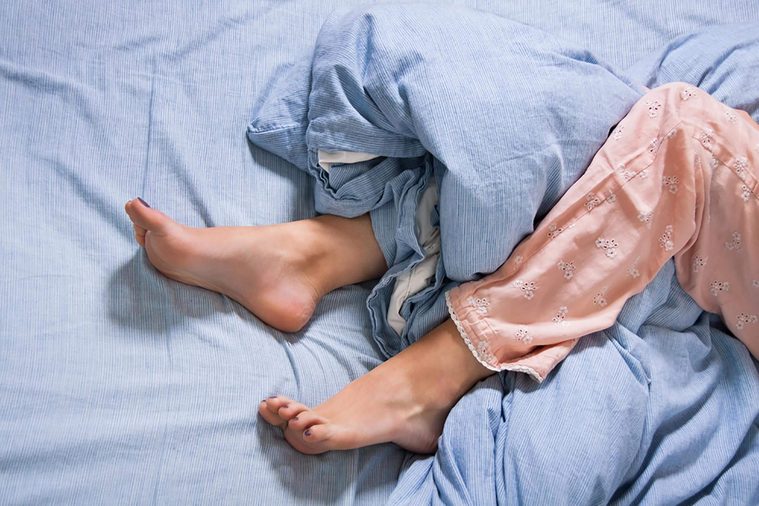
Thyroid disorders
Both over-active (hyperthyroidism) and under-active (hypothyroidism) thyroid conditions frequently cause chronic sleep problems, not to mention plenty of other serious health issues. The thyroid gland produces hormones that regulate metabolism, and have a widespread influence over the body’s systems, from brain function to appetite to mood and energy, as well as sleep. Insomnia is a hallmark symptom of hyperthyroidism—an over-active thyroid can make it difficult to fall asleep and stay asleep. Other symptoms of hyperthyroidism include racing heartbeat, hand tremors, increased sweating, muscle weakness, anxiety and irritability. According to Oxford Academic, hypothyroidism can also cause sleep difficulties, including more frequent awakenings. Fatigue, depression, difficulty concentrating, dry skin, and feeling cold are other symptoms of hypothyroidism. A simple blood test can determine your thyroid levels, so speak with your doctor if you’re experiencing disrupted sleep and other thyroid-related symptoms, such as thinning hair and excessive sweating. Learn about some surprising things that could be wrecking your sleep.

Stress
Stress can be acute, a reaction to unexpected, difficult life events, such as the death of a loved one, or the loss of a job—and it’s also a common source of sleeping problems. A survey by the American Psychological Foundation found 43 percent of adults said stress kept them awake during the past month. Stress can be chronic, as well—a response to daily life, and the pressures of work, family, relationships, and finances. Both types of stress can lead to insomnia. Stress and sleep influence one another: Stress creates sleeplessness, and poor sleep makes us more prone to stress. Stress reverberates throughout the body, and may cause muscle tension and pain, upset stomach, appetite changes, and fatigue. Stress also causes mood swings, irritability, difficulty concentrating, memory problems, and racing thoughts. If you experience trouble sleeping and other stress-related symptoms several times a week for more than a month, see your doctor.

Restless leg syndrome
Restless leg syndrome, or RLS, is an under-diagnosed sleep disorder that causes uncomfortable tingling, crawling, or pulling sensations in the legs. People with RLS feel a powerful need to move their legs, to relieve these irritating sensations. The symptoms of RLS are typically worse at night. As a result, people with RLS can’t fall asleep and stay asleep easily. Research indicates sleeping problems affect more than two-thirds of people with RLS. Chronic poor sleep linked to RLS causes fatigue and makes it difficult to function at your best. RLS leg sensations tend to flare during periods of sitting or lying down, making it difficult to relax during the day or night. Do you experience uncomfortable leg sensations along with trouble sleeping? Talk with your physician about your symptoms. Plus, here are some habits you think are harmless that could be causing your insomnia.

GERD
GERD is another name for acid reflux, the rise of stomach acid into the esophagus, which causes burning irritation in the chest and throat. Surprised that acid reflux may be causing your sleep troubles? GERD symptoms tend to be more severe at night. Reclining makes it easier for stomach acid to linger in the esophagus. Swallowing can push acid back to the stomach, and the saliva helps to counteract the effects of acid in the esophagus—but during sleep our swallowing reflex is greatly reduced. Nighttime acid reflux can make it more difficult to fall asleep, cause restless sleep with more frequent awakenings, and lead to poor quality sleep. If you feel like your sleep is suffering and you have symptoms like a dry cough, trouble swallowing, sore throat, an unpleasant taste in the mouth, you may have the signs of GERD; schedule an appointment with your doctor.

Sleep apnea
Chronic tiredness and obstructive sleep apnea go hand in hand. Even if you think you’re sleeping well, sleep apnea can prevent you from getting a truly restful snooze: Watch for the less obvious signs of sleep apnea, including morning headaches and dry mouth, difficulty concentrating and forgetfulness, depression, mood swings, and irritability. Research indicates that as many as 67 percent of insomnia sufferers also have at least a mild form of sleep apnea. Sufferers experience episodes of shallow or interrupted breathing while they rest. These episodes can move you from deeper to lighter sleep and cause brief awakenings, leading to daytime exhaustion and fatigue. Many people don’t know they’re experiencing apnea episodes—it’s often bed partners who alert sleepers to their symptoms. Loud snoring and gasping or choking sounds are common signs. There are effective treatments, so if you snore and struggle with chronic sleep troubles, talk with your physician. Watch out for these other signs of sleep apnea you could be ignoring.

Anxiety
People with insomnia are more than 17 times as likely to struggle with anxiety disorders, according to research. With the body in anxiety’s fight-or-flight mode, the nervous system is on high alert, stress hormones surge, muscles tense, heart rate rises, and it can be hard to fall asleep and stay asleep. Chronic anxiety involves worries and fears that are persistent and exaggerated. Ever-present anxiety can impede normal daily functioning—and healthy sleep. Nearly all of my patients with anxiety say they regularly can’t fall asleep. Many have intrusive thoughts that don’t allow them to drift off. Often people with anxiety will wake very early, feeling unrefreshed by their night’s rest. More than 40 million U.S. adults cope with anxiety disorders—they are the country’s most common mental health conditions. Seek counseling if worried or racing thoughts keep you up for more than two weeks at a time.

Depression
Disrupted, abbreviated sleep can be a sign of depression, though it’s important to know that excessive sleeping can be another sign of depression. However, research shows people with insomnia are nearly ten times as likely to suffer depression—and sleep troubles can persist even after depression has lifted. Disrupted sleep is both a symptom of depression and a risk factor for developing the mood disorder; depression can trigger sleep problems, and poor sleep can contribute to depression. Be alert to other depression symptoms, such as a lack of interest in things that give you pleasure, feelings of sadness, hopelessness, and guilt, restlessness, and mood swings. If you experience these symptoms for more than two weeks, it’s time to seek professional help. Watch out for these other scary things that happen to your body when you get too much sleep.

Allergies
Think a sniffling, itchy nose can’t cause real trouble with your sleep? Think again. Research suggests people with several common allergies are more than twice as likely to have insomnia. Allergy symptoms—nasal congestion, coughing and sneezing, itchy, watery eyes—can make it tough to fall asleep, lead to restless, fragmented sleep, and leave you feeling tired and un-rested come morning. Some nasal allergy symptoms increase risks for snoring and obstructive sleep apnea. Know your allergy triggers, keep your bedroom clean, and make sure you have fresh sheets on your bed to reduce allergens in your sleep environment. You may want to talk with an allergist if your sleep is routinely or seasonally disrupted by itching, sneezing, coughing allergy symptoms.

Chronic pain
Pain and sleep problems frequently occur together. Chronic pain that disrupts sleep can also stem from injury and over-training. (I see a lot of patients with sleeplessness who overdo it with exercise.) As many as 90 percent of chronic pain sufferers also struggle with sleep problems, according to research. Pain and sleep have a complicated relationship: Pain interferes with sleep, and poor sleep can aggravate pain. The result: a frustrating, escalating cycle of sleeplessness and physical discomfort. Lack of sleep lowers pain thresholds, making us more sensitive to discomfort. Studies show chronic poor-quality sleep may increase your risk for future risk for chronic pain. Conditions such as arthritis, fibromyalgia, headache, and migraine are all linked to trouble sleeping. If physical discomfort at night makes it hard to fall asleep, or if you wake sore, stiff, and tired several days a week for more than a month, talk with your doctor. Check out these secrets to better sleep that sleep doctors wish you knew.

Alzheimer’s disease
New research indicates that poor sleep could be one early signal of Alzheimer’s disease in people with a family history or genetic predisposition to the disease. Scientists found that older adults, with an average age of 63, who reported lower sleep quality had a greater number of biological markers for Alzheimer’s disease in spinal fluid than those without sleep difficulties. There’s a growing body of research showing disrupted sleep may increase risks for Alzheimer’s disease and other neurological disorders, including dementia and Parkinson’s disease. Tending to sleep problems promptly can help protect your neurological health, so can sticking to a healthy diet and giving your brain a regular workout. It’s important to see your physician if you experience disrupted sleep in combination with cognitive difficulties and changes to mood.

Medications
Sometimes, difficulty sleeping isn’t a result of a health condition itself, but of the medication you’re using to treat it. A broad array of medications, both prescription and over-the-counter, can trigger sleeping problems. Antihistamines and cold medications, high blood pressure and cholesterol drugs, corticosteroids for asthma, medications to treat depression and anxiety, and drug treatments for attention deficit disorder are among the dozens of medications that can disrupt sleep. Talk with your physician before adding new medications to your regular routine, and familiarize yourself with the side effects of all medications you’re taking. Trouble sleeping that lasts beyond four weeks is something to discuss with your doctor, along with a review of your current medications. Read on for some sleep disorders you need to know about—besides sleep apnea.